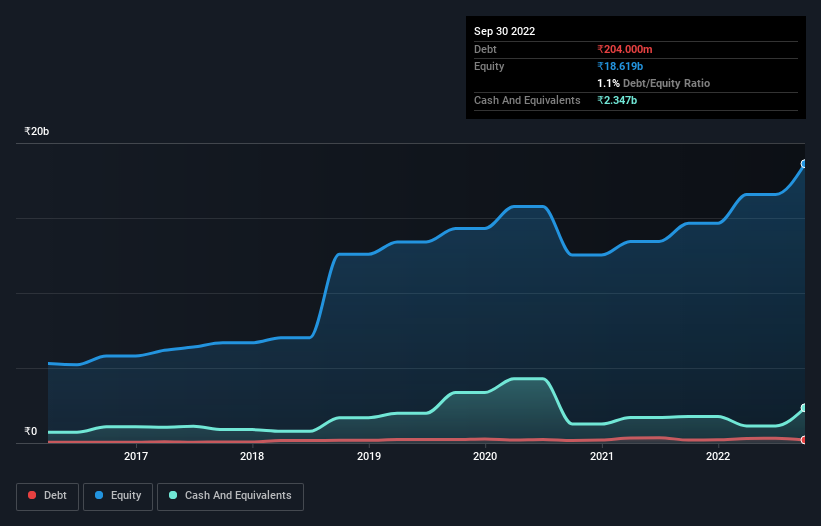We Think Timken India (NSE:TIMKEN) Can Stay On Top Of Its Debt

The external fund manager backed by Berkshire Hathaway's Charlie Munger, Li Lu, makes no bones about it when he says 'The biggest investment risk is not the volatility of prices, but whether you will suffer a permanent loss of capital.' When we think about how risky a company is, we always like to look at its use of debt, since debt overload can lead to ruin. Importantly, Timken India Limited (NSE:TIMKEN) does carry debt. But the real question is whether this debt is making the company risky.
Why Does Debt Bring Risk?
Debt is a tool to help businesses grow, but if a business is incapable of paying off its lenders, then it exists at their mercy. If things get really bad, the lenders can take control of the business. However, a more usual (but still expensive) situation is where a company must dilute shareholders at a cheap share price simply to get debt under control. Having said that, the most common situation is where a company manages its debt reasonably well - and to its own advantage. The first thing to do when considering how much debt a business uses is to look at its cash and debt together.
Check out our latest analysis for Timken India
What Is Timken India's Debt?
As you can see below, at the end of September 2022, Timken India had ₹204.0m of debt, up from ₹195.2m a year ago. Click the image for more detail. But on the other hand it also has ₹2.35b in cash, leading to a ₹2.14b net cash position.

How Healthy Is Timken India's Balance Sheet?
Zooming in on the latest balance sheet data, we can see that Timken India had liabilities of ₹4.42b due within 12 months and liabilities of ₹956.0m due beyond that. Offsetting this, it had ₹2.35b in cash and ₹6.19b in receivables that were due within 12 months. So it actually has ₹3.16b more liquid assets than total liabilities.
Having regard to Timken India's size, it seems that its liquid assets are well balanced with its total liabilities. So it's very unlikely that the ₹240.3b company is short on cash, but still worth keeping an eye on the balance sheet. Simply put, the fact that Timken India has more cash than debt is arguably a good indication that it can manage its debt safely.
On top of that, Timken India grew its EBIT by 71% over the last twelve months, and that growth will make it easier to handle its debt. There's no doubt that we learn most about debt from the balance sheet. But you can't view debt in total isolation; since Timken India will need earnings to service that debt. So if you're keen to discover more about its earnings, it might be worth checking out this graph of its long term earnings trend.
Finally, a business needs free cash flow to pay off debt; accounting profits just don't cut it. While Timken India has net cash on its balance sheet, it's still worth taking a look at its ability to convert earnings before interest and tax (EBIT) to free cash flow, to help us understand how quickly it is building (or eroding) that cash balance. Looking at the most recent three years, Timken India recorded free cash flow of 29% of its EBIT, which is weaker than we'd expect. That weak cash conversion makes it more difficult to handle indebtedness.
Summing Up
While we empathize with investors who find debt concerning, you should keep in mind that Timken India has net cash of ₹2.14b, as well as more liquid assets than liabilities. And we liked the look of last year's 71% year-on-year EBIT growth. So is Timken India's debt a risk? It doesn't seem so to us. The balance sheet is clearly the area to focus on when you are analysing debt. But ultimately, every company can contain risks that exist outside of the balance sheet. Be aware that Timken India is showing 1 warning sign in our investment analysis , you should know about...
If you're interested in investing in businesses that can grow profits without the burden of debt, then check out this free list of growing businesses that have net cash on the balance sheet.
Valuation is complex, but we're here to simplify it.
Discover if Timken India might be undervalued or overvalued with our detailed analysis, featuring fair value estimates, potential risks, dividends, insider trades, and its financial condition.
Access Free AnalysisHave feedback on this article? Concerned about the content? Get in touch with us directly. Alternatively, email editorial-team (at) simplywallst.com.
This article by Simply Wall St is general in nature. We provide commentary based on historical data and analyst forecasts only using an unbiased methodology and our articles are not intended to be financial advice. It does not constitute a recommendation to buy or sell any stock, and does not take account of your objectives, or your financial situation. We aim to bring you long-term focused analysis driven by fundamental data. Note that our analysis may not factor in the latest price-sensitive company announcements or qualitative material. Simply Wall St has no position in any stocks mentioned.
About NSEI:TIMKEN
Timken India
Manufactures and distributes tapered roller bearings, other roller bearings, components, and accessories for the automotive sector and railway industry in India, the United States, and internationally.
Flawless balance sheet with moderate growth potential.
Similar Companies
Market Insights
Community Narratives




